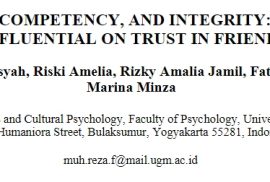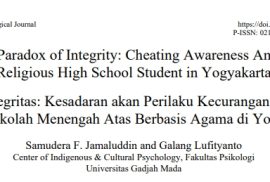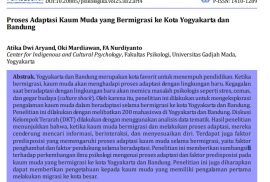ABSTRACT. Personal variables are often assumed to affect trust. In Indonesia, there are three personal variables that affect trust: benevolence, competence, and integrity. This study aims to examine the influence of these three variables on friendship relationships. The respondents of this study consists of 220 students of Universitas Gadjah Mada (44.1% male and 55.9% female). Data were collected using the Trust Scale (α = .74), the Benevolence Scale (α=.85), the Competence Scale (α = .80), and the Integrity Scale (α = .78). Regression analysis revealed that competence has no significant influence towards trust, and the role of benevolence is greater than integrity. Based on these findings we constructed regression models with benevolence as the main variable and integrity as an additional variable. As a single factor, thecontribution of benevolence is 21.4%. The addition of integrity in the regression model finds that the contribution of both variables together is 29.2%.
ABSTRACT. Cheating behavior in a school setting has become a major problem in many countries, including those with a dominantly religious population (e.g., Indonesia). This creates a paradox since previous literatures suggest eminent role of spirituality and cheating behavior in religious high school students in Yogyakarta using multi-methods approach. Self-report were distributed to a total of 691 participants using random sampling method. Participants were also given an open-ended questionnaire asking the rationale behind their past cheating behavior. The findings suggested that the role of spirituality in ethical behavior was rather contextual, such as the link between spirituality and awareness of cheating was more robust in the respondents from religious schools. It was found that the participants viewed spirituality as an internal moral compass which may in turn facilitate overt ethical behavior.
ABSTRACT. Gossip is a daily phenomenon but largely neglected in the scientific literature. Therefore, this study aims to analyze the dynamics of gossip activities in the Tilik short movie. The theory used is the Self-Concept Enhancing Tactician (SCENT) model, which shows that a person is looking for information and evaluating that information with three objectives: self-empowerment, self-promotion, and selfprotection. The method used in this study was an interpretative qualitative approach (Denzin) to explain the function of gossip in Tilik movie. The result of this study indicates that gossip has two prominent functions: self-promotion and selfprotection. If the gossip is perceived by the gossipmongers as a downward comparison, the chance for self-promotion is higher. Meanwhile, if it is considered as a threat, individuals will protect themselves in various ways. Self-promotion involves the emotion of pride and self-protection involves the emotion of fear. This research is expected to add insight into how gossip is used in society.
ABSTRACT.Yogyakarta dan Bandung merupakan kota favorit untuk menempuh pendidikan. Ketika bermigrasi, kaum muda akan menghadapi proses adaptasi dengan lingkungan baru. Kegagalan saat beradaptasi dengan lingkungan baru akan memicu masalah psikologis seperti stres, cemas, dan gegar budaya (culture shock). Oleh karena itu, penelitian ini dilakukan untuk mengeksplorasi pengalaman kaum muda dalam beradaptasi selama bermigrasi ke kota Yogyakarta dan Bandung. Penelitian ini dilakukan dengan melibatkan 200 mahasiswa di Yogyakarta dan Bandung. Diskusi Kelompok Terarah (DKT) dilakukan dengan menggunakan analisis data tematik. Hasil penelitian menunjukkan bahwa, ketika kaum muda bermigrasi dan melakukan proses adaptasi, mereka cenderung mencari informasi, berinteraksi, dan menyesuaikan diri. Terdapat juga faktor predisposisi yang memengaruhi proses adaptasi kaum muda selama bermigrasi, yaitu faktor
penghambat dan faktor pendukung selama beradaptasi. Penelitian ini memberikan sumbangsih terhadap perkembangan ilmu psikologi mengenai proses adaptasi dan faktor predisposisi pada kaum muda yang bermigrasi ke kota Yogyakarta dan Bandung. Penelitian ini juga diharapkan dapat memberikan pengetahuan kepada kaum muda yang memiliki pengalaman pertama melakukan migrasi ke kota besar.




